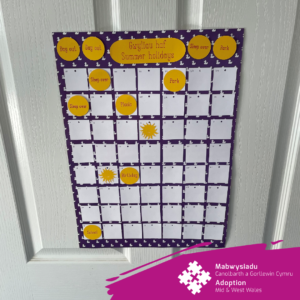
Routine Chart
The six-week school summer break has arrived, and the change of routine can make children and their parents feel overwhelmed, so we have come up with some top tips to help you manage the next few weeks.
Routines and boundaries
Kids thrive on routines, but routines will inevitably change over the summer period, without the feeling of safety the school day can bring. Organise a routine from the start of the holidays and try to keep to it as best as you can. Try to avoid surprises like impromptu BBQs and unplanned day trips. Having a visual chart with activities is an effective way to help children see when you are going to be out, going on holiday (and returning) and it also acts as a countdown to when school will be back.
Ensure that boundaries and rules are in place from the beginning. It could mean setting tasks to be completed, such as get dressed; have breakfast; brush teeth, before 30 minutes of electronics.
Plan Days out
Involve your child in the planning of days out, it doesn’t have to cost the earth, it could be a bike ride, or a visit to the park for a picnic. Knowing what they are going to be doing from day to day will help manage the anxiety of the unexpected from such a lengthy period away from school. Remember not to cram too much in and have some down time at home too.
Take time for yourself
6 weeks is a long time to keep the children entertained. Speak to your support network about helping you out for the odd day here and there, to allow you time to re-charge your batteries. Many parents will also need to work during this time, so planning ‘me time’ is especially important.
Going on holiday
If you are going abroad or holidaying in this country, discussing returning home is just as important as talking about going away, as many children will carry with them the thoughts of when they left the care of their birth parents or foster carers. If your child is anxious about flying, reading stories about going on holiday and watching YouTube videos of flights can help.
Having a visual chart showing when you are going away and when you are returning, will add reassurance to your child that they will be coming back. Packing regulating toys and the toys they play with the most can also add a sense of normality, by taking a part of home away with them.
Playfulness
Adding playfulness activities into each day’s routine can help build the trust and connection you have with your child. It doesn’t have to be for hours but adding some quality time (at least 20 minutes) to play will help keep your child calm, and know that you are there for them.
Expectations
We all have good days and bad days and children are no different. We all cope with things differently, so set yourself realistic expectations. Attractions can be busier than normal over the summer, so help manage your child’s expectations, that they may not be able to ride all the rides in the theme park or see all the animals at the zoo. You can use this to teach your child how to deal with disappointment and manage the big feelings that they may have.
If you have tips that you have used to manage the long summer period that have worked with your child that you’d like to share with other adopters then please contact us adoptionwebsite@carmarthenshire.gov.uk


